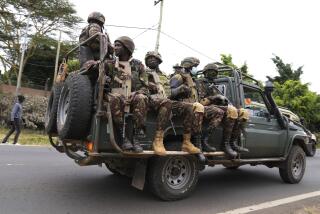After 19 Years, Kenya’s Moi Hears Doors Slamming at Home and Abroad
- Share via
NAIROBI, Kenya — Rarely during his 19 years in power has Kenyan President Daniel Arap Moi appeared more embattled and isolated.
Foreign allies who once lauded the relative stability of his regime now openly criticize its repressive moves against critics. The International Monetary Fund has blocked an aid package to the East African nation, citing widespread government corruption and other financial scandals.
And domestic opposition groups are turning up the heat with mass demonstrations and other actions designed to force Moi to commit to democratic reforms. A nationwide general strike Friday disrupted business here in the capital and erupted in clashes that left at least two people dead.
The crisis has brought Kenya to a crossroads--one path pointing to progress, the other to chaos, some observers say. And Moi, who at 73 is seeking a fifth and final five-year term in elections later this year, faces a tremendous task: convincing Kenya’s 29 million people, and the international donors who have long backed his regime, that he deserves to stay at the nation’s helm.
Some observers see Kenya’s current turmoil as the continuation of a pro-democracy movement that in 1991 forced Moi to allow multi-party elections.
“The country is paying the price for decades of somewhat authoritarian rule compounded by a significant dose of mismanagement of the economy and, to put it bluntly, corruption,” said one Western diplomat.
Friday’s strike--called by the National Convention Assembly, a loose alliance of opposition politicians, civil rights activists and church leaders--was the boldest move yet by reform advocates who four months ago began pushing Moi to revise complex electoral rules that give him an advantage and to abolish several repressive colonial-era laws.
Opposition leaders vowed Friday to continue their fight. “Pleading has just fallen on deaf ears,” said opposition lawmaker Raila Odinga, the son of Kenya’s first vice president. “If we continue with more pressure, they will definitely yield.”
Twenty-two nations condemned the brutality of Kenyan security forces during pro-reform rallies July 7--brutality that left at least seven people dead. And the United States has publicly urged Moi to take steps to create a free and fair electoral climate.
The IMF’s suspension of a $220-million loan last week rocked the stock and foreign exchange markets in Kenya, a country that in recent years had been hailed as one of the continent’s few success stories--a reliable source of foreign investment and a popular tourist destination.
The Kenyan shilling has plunged 18% in the wake of the IMF action, which Moi slammed as a “purely political” move that lacked economic sense and would hurt average Kenyans.
Moi’s government has announced that it will repeal several laws restricting freedom of assembly and speech and stop the indefinite detention of individuals who have not been charged, and he has called for talks with the opposition. The ruling Kenya African National Union party has promised to set up a commission to review Kenya’s constitution.
But reformists say such moves are superficial and inadequate. “These are cosmetic concessions that are aimed at placating international donors,” Odinga said. “They mean nothing.”
Moi has carefully selected the activists--primarily religious leaders--with whom to hold talks; the leadership of the National Convention Assembly is not included. And critics say that, with its three-year timetable, the proposed constitution review commission would simply buy time for the government.
Opponents want preelection reforms that would require the winner of the presidency to garner at least 50% of the popular vote or face a runoff. They are also demanding changes that would make it easier to legally register political parties, and the lifting of restrictions on the media.
Government officials insist that steps they have already taken toward reform far outweigh what remains to be done. Nonsense, say opposition members.
“Mr. Moi is a master of appearing to do things which he hasn’t done,” said paleontologist Richard E. Leakey, the popular leader of the unregistered Safina party. “He is trying to persuade the international community that he is a good guy. But I don’t think he is.”
Margaret Popkin, Africa program director at the Washington-based Robert F. Kennedy Memorial Center for Human Rights, noted that Kenya’s record on democracy is being judged more and more critically and is being compared with those of other East African nations, such as Uganda and Tanzania, that have made significant strides in this arena.
“That Kenya’s transition has been more incomplete is more noticeable now,” Popkin said. “Its stability and its regional importance have led the international community to downplay at times its one-party rule and limitations of democratic rights.”
Critics say Moi has ruined the country: Hospitals lack basic medicines, crime is endemic, and few public servants will do their jobs without a bribe. “We are falling apart,” Leakey said.
More to Read
Sign up for Essential California
The most important California stories and recommendations in your inbox every morning.
You may occasionally receive promotional content from the Los Angeles Times.











